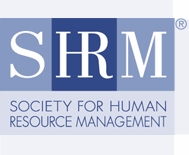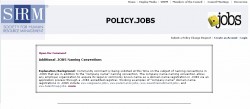A SHRM executive said this afternoon that the organization has taken no position on proposed changes to career site addresses, nor did it have anything to do with a call for public comment.
Gary Rubin, SHRM’s chief publishing, e-media, and business development officer, said he was unaware of what content is published on Policy.Jobs adding, “There is no public comment period. That is not something SHRM did.”
He says the site is owned by Employ Media, SHRM’s partner in the .jobs domain project, and the content there was posted by the company. Rubin called up the site while we were on the phone and sounded surprised when it came up. “Oh,” he said, “This is interesting.” He said it was the first time he had seen it.
 Nevertheless, Rubin said it is possible that a SHRM council scheduled to meet Friday afternoon at 3 p.m. EDT might itself endorse a call for public input when it considers a proposal to amend the rules governing Internet addresses using the .jobs extension.
Nevertheless, Rubin said it is possible that a SHRM council scheduled to meet Friday afternoon at 3 p.m. EDT might itself endorse a call for public input when it considers a proposal to amend the rules governing Internet addresses using the .jobs extension.
If you are wondering what this all about, there’s plenty of background in the article I posted Wednesday evening. You can find it here. ERE CEO David Manaster also provides a synopses of the events and offers his take on the issue.
Briefly, the story is this: In 2004 the Society for Human Resource Management joined forces with a private firm — Employ Media — to create a new domain called .jobs. The idea was to create a way for companies to easily point job seekers to their corporate career site.
Only company names would be allowed — att.jobs, for instance — and applicants for these addresses would have to be experienced HR professionals and subscribe to the principles of SHRM’s code of ethics.
SHRM’s role as sponsoring organization was to ensure the addresses were being issued in the interests of the HR community and in compliance with the rules outlined in the agreement between Employ Media and the company that oversees Internet addressing.
Now, Employ Media is asking SHRM to give its consent to a change in the rules to allow a .jobs address to be issued in almost any name. They would still have to comply with the HR involvement requirements, but names like Nursing.jobs and NewYork.jobs would be permitted.
Rubin told me his nine-member council will take up the matter during its teleconference Friday. It can vote down the change, in which case, he said, the matter is dead. Or, it can approve it, which sends it on to be considered by SHRM’s executive team. Or, the council can decide it needs more information and could request public comment.
“This is entirely up to them,” said Rubin, who serves as council manager. He hazarded no guess as to the outcome, though he said SHRM would announce the vote, but probably not immediately.
I reached out to several members of the council, but haven’t heard from any of them.
If you’ve followed this so far, take a look at this page where it lists a March 4th agenda for the council.
I asked Rubin why there would be a vote Friday, when it appears one was taken March 4th. He was quick to say that everything done then was “withdrawn” and no minutes of that meeting will be released. The council that took that action was replaced, he told me.
Why?
Well the council manager was Bill Warren, executive director of DirectEmployers Association. His organization had been launching non-company name job boards on the .jobs address for months, under an arrangement it had with Employ Media.
But publicity about these job boards, which Warren was saying could come to number tens of thousands, attracted the attention of the Internet’s governing body. Rubin said he received a letter a from the Internet Corporation For Assigned Names and Numbers asking that SHRM appoint a council to consider forthcoming amendments to the agreement.
Rubin appointed Warren, who formed the council. Warren’s name appears on an issues paper about changing the rules for issuing .jobs addresses. That paper never mentions that DirectEmployers already was launching job boards.
Although Rubin told me he saw “no inherent conflict of interest” in having the head of a potential beneficiary as manager of the group that would consider the change, enough others did that Rubin took on the role of manager himself. He also changed the composition to include members active in other SHRM boards and groups, and a representative of the job board industry, Aaron Matos, CEO and founder of Jobing.com.
As you can imagine, the job board industry is a major stakeholder. If the rules are changed and DirectEmployers and Employ Media move forward in deploying the thousands of geographic and occupationally named job boards, some existing boards could be hurt.
On the other hand, even if all changes get made and thousands of new job boards come online, job seekers have to find them. And so far, search engines have barely noticed there is a .jobs domain.
I’ve been pestering Peter Weddle, the head of the job board trade group (International Association of Employment Web Sites), for the group’s position. So far, he hasn’t gotten back to me. That’s not so surprising, since DirectEmployers Association is a member of the organization.
The IAEWS board had its own teleconference this afternoon to consider what position to take regarding the SHRM council vote Friday. If there was a decision, I haven’t heard.